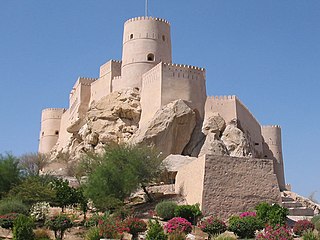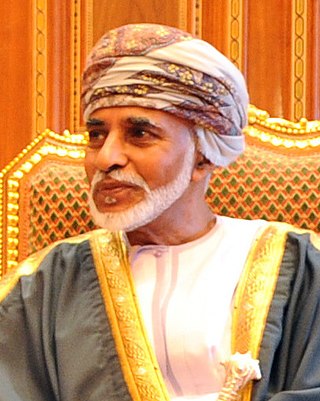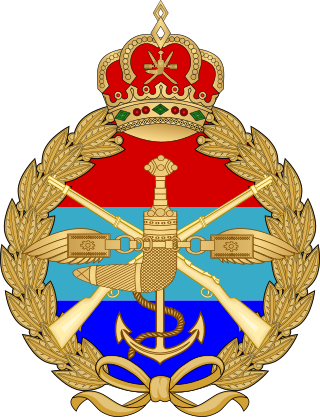Related Research Articles

Oman is a site of pre-historic human habitation, stretching back over 100,000 years. The region was impacted by powerful invaders, including other Arab tribes, Portugal and Britain. Oman, at its height, held holdings that ranged from the Persian Gulf all the way south to the island of Madagascar, some notable holdings include; the island of Zanzibar, the city of Mogadishu and the city of Gwadar.

Said bin Taimur was the 13th Sultan of Muscat and Oman from 10 February 1932 until he was deposed on 23 July 1970 by his son Qaboos bin Said.

Qaboos bin Said Al Said was Sultan of Oman from 23 July 1970 until his death in 2020. A fifteenth-generation descendant of the founder of the House of Al Said, he was the longest-serving leader in the Middle East and Arab world at the time of his death, having ruled for almost half a century.

The Dhofar Governorate is the largest of the 11 governorates in the Sultanate of Oman in terms of area. It lies in southern Oman, on the eastern border with Yemen's Al Mahrah Governorate and the southern border with Saudi Arabia's Eastern Province. It is a rather mountainous area that covers 99,300 km2 (38,300 sq mi) and had a population of 416,458 in the 2020 census. Salalah is the largest city and capital of the governorate. Historically, the region was a source of frankincense. The local dialect of Arabic is Dhofari Arabic, which is distinct from that used in the rest of Oman and in Yemen.

The Sultan of Oman's Armed Forces or Sultan's Armed Forces (SAF) are the armed forces of Oman. They constitute the Royal Army of Oman, Royal Navy of Oman, Royal Air Force of Oman, Sultan's Special Force and other defense forces of the Sultanate of Oman.

The Sultanate of Muscat and Oman, also known briefly as the State of Muscat and Oman during the rule of Taimur bin Feisal, was a sovereign state that encompassed the present-day Sultanate of Oman and parts of present-day United Arab Emirates and Pakistan, in the second half of the 19th century and 20th century. Ruled by the Busaid dynasty, it was established as a result of the partition of the Omani Empire upon the death of its last ruler Said bin Sultan. The Sultanate transitioned into a new form of government after the palace coup of 23 July 1970 in which the sultan Said bin Taimur was immediately deposed in favor of his son Qaboos bin Said.

Dhofar Liberation Front (DLF) was a communist front that was established to create a separatist state in Dhofar, the southernmost province of Oman, which shared a border with South Yemen.

The Popular Front for the Liberation of Oman was a Marxist and Arab nationalist revolutionary organisation in the Sultanate of Oman. It fought against the Sultan (ruler) in the Dhofar Rebellion from the PFLO's foundation until the suppression of the insurgency in 1976.

The Dhofar War took place from 1963 to 1976 in the province of Dhofar against the Sultanate of Muscat and Oman. The war began with the formation of the Dhofar Liberation Front, a Marxist group which aimed to create an independent state in Dhofar, free from the rule of the Omani Sultan Said bin Taimur. The rebels also held the broader goals of Arab nationalism which included ending British influence in the Persian Gulf region. Omani and British goals, on the other hand, were to safeguard Oman from communism and halt the spread of communist ideology as part of the broader Cold War.

Yusuf bin Alawi bin Abdullah is an Omani politician. He was the Sultanate of Oman's Minister Responsible for Foreign Affairs. It is important to clarify that "Ministers in Responsibility" were previously appointed as the Sultan was intended to hold the official position of "Minister of Foreign Affairs" himself.
Hussain Ali Farah Al-Hadhri, commonly known as Hussain Al-Hadhri, is an Omani footballer who plays for Dhofar Club in Oman Professional League.

A Firqa sometimes called Firqat colloquially in the plural), is a local militia unit loyal to the Sultan of Oman raised in the Dhofar region of Oman during the Dhofar War. The British were known for utilising Firqa during their counter insurgency operations in support of the Sultan's operations in the region, converting former enemies into pro-government militia to aid in counter-insurgency; this was a tactic the British had successfully employed in Malaya. Forming local Firqa was therefore great way to employ surrendered enemy personnel (SEPs) and thus pacify areas of the Dhofari Jebel and set the conditions for infrastructure development.

Peninsular Arabic are the varieties of Arabic spoken throughout the Arabian Peninsula. This includes the countries of Saudi Arabia, Yemen, Oman, United Arab Emirates, Kuwait, Bahrain, Qatar, Southern Iran, Southern Iraq and Jordan.

The Foreign Ministry is the government body in the Sultanate of Oman responsible for organising and directing Oman's relations with other countries and with regional and international organisations.
Major General John David Carew Graham, was a British Army officer who was instrumental in the installation of Qaboos bin Said as Sultan of Oman in the 1970 Omani coup d'état.

In line with the Arab League position in relation to Israel, Oman does not officially recognize the state of Israel and took part in the boycott of Israel during much of the 20th century.

The Sultan's Special Force (SSF) — Arabic: قوات السلطان الخاصة, transliterated:Qawat al-Sultaniya al-Khasah is a separate force branch within the Sultan's Armed Forces (SAF) and although equipped to carry out land defense operations, it is not part of the Royal Army of Oman.

The Royal Office is one of the most senior and therefore powerful ministries in the Sultanate of Oman. It is a government body that has most influence in national security and intelligence issues and the minister in charge has been the de facto national security advisor to the Sultan. The Palace Office also acts as a foreign liaison focus on all international intelligence and security matters.

The 1970 Omani coup d'état was the overthrow of Sultan of Oman Said bin Taimur by his son Qaboos bin Said in Oman on 23 July 1970. Occurring in the midst of the Dhofar War, the palace coup was executed with the British and saw Sultan Said bin Taimur deposed and sent into exile to the United Kingdom. The coup was a pivotal moment in modern Omani history as Qaboos swiftly set in motion numerous wide-ranging modernisation reforms in the sultanate, transforming Oman from an underdeveloped backwater into a country on par with many Western states in terms of political stability and economic development. At the time of his death in January 2020, Sultan Qaboos was the longest-serving ruler in the Middle East.

The Oman–Yemen border is 294 km (183 mi) in length and runs from the tripoint with Saudi Arabia in the north to the Arabian Sea in the south.
References
- ↑ Walton, Thomas E. (2015). Headed The Wrong Way: The British Army's Painful Re-Acquaintance With Its Own COIN Doctrine In Southern Iraq. Pickle Partners Publishing. ISBN 9781786252319 . Retrieved 25 August 2017.
- ↑ Takriti, Abdel Razzaq (2013). Monsoon Revolution: Republicans, Sultans, and Empires in Oman, 1965–1976. OUP Oxford. pp. 63–64. ISBN 9780191656194 . Retrieved 26 August 2017.
- ↑ Jones, Jeremy; Ridout, Nicholas (2015). A History of Modern Oman. Cambridge University Press. p. 138. ISBN 9781107009400 . Retrieved 25 August 2017.
- ↑ "Tribes and languages of Dhofar | About Dhofar". Rough Guides. Retrieved 25 August 2017.
- ↑ Valeri, Marc (2009). Oman: Politics and Society in the Qaboos State. Hurst. pp. 57–58. ISBN 9781850659334 . Retrieved 25 August 2017.
- ↑ "Oman: The Death of the Last Feudal Arab State" . Retrieved 25 August 2017.
- ↑ Marston, Daniel; Malkasian, Carter (2011). Counterinsurgency in Modern Warfare. Bloomsbury Publishing. ISBN 9781849086523 . Retrieved 25 August 2017.
- ↑ Walton, Thomas E. "Headed the Wrong Way: The British Army's Painful ReAcquaintance with Its Own COIN Doctrine in Southern Iraq, Page 77" (PDF). US Army. Archived (PDF) from the original on March 3, 2017. Retrieved 25 August 2017.
- ↑ McKeown, Major J H (1981). "Britain and Oman. The Dhofar War and its Significance". University of Cambridge, MPhil Dissertation: 28.
- ↑ Halliday, Fred (2013). Arabia Without Sultans, Chapter 11. Saqi. ISBN 9780863567148 . Retrieved 25 August 2017.
- ↑ Jones, Jeremy; Ridout, Nicholas (2015). A History of Modern Oman. Cambridge University Press. p. 143. ISBN 9781107009400 . Retrieved 25 August 2017.
- ↑ Ibid. p152